The term ‘Indo-Pacific’ is a multifaceted and highly politicized concept that is vulnerable to manipulation and interpretation by external powers seeking to advance their agendas. In recent years, Southeast Asia has emerged as a pivotal arena in the ongoing discourse surrounding the Indo-Pacific. While debates regarding the Indo-Pacific have traditionally revolved around security and economic considerations, there is a growing acknowledgement of the significant role played by civil society in shaping this narrative. This article endeavours to examine the nuanced repercussions of the Indo-Pacific’s geopolitical rivalry on Southeast Asian non-governmental organizations (NGOs). It seeks to shed light on how these NGOs navigate the intricate geopolitical terrain, one increasingly characterized by intense great power competition and clashing interests. By exploring the challenges and opportunities faced by Southeast Asian NGOs in this context, this article offers valuable insights into the evolving dynamics of regional geopolitics and the vital role of civil society in shaping them.
